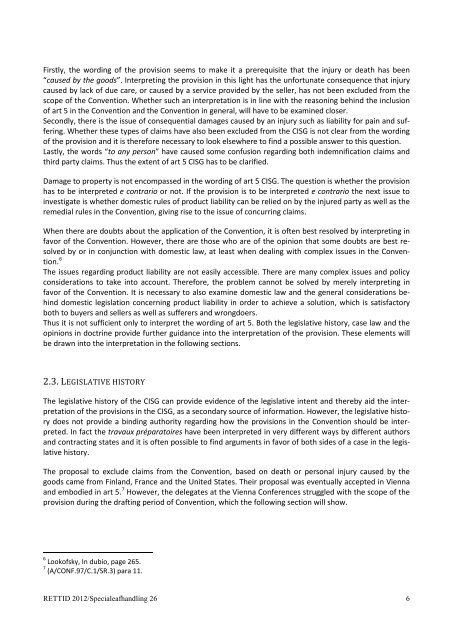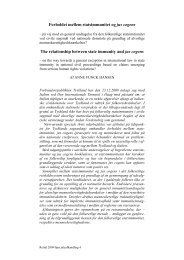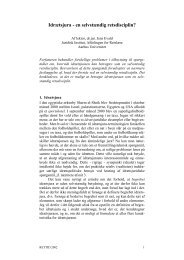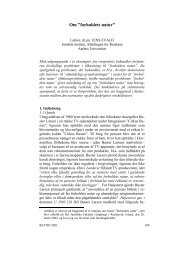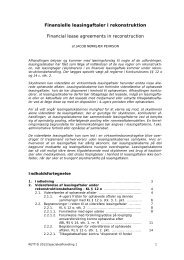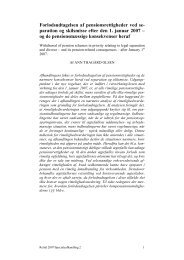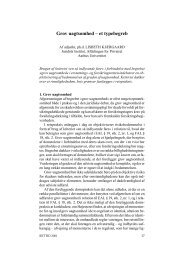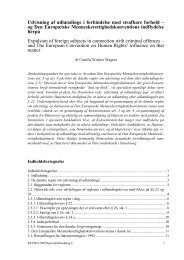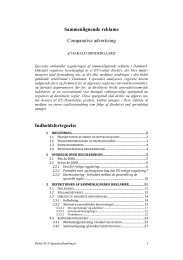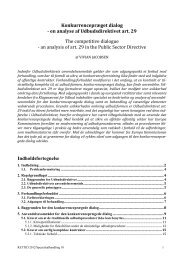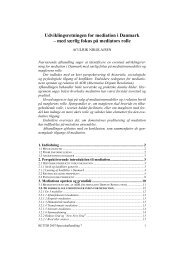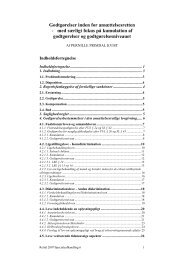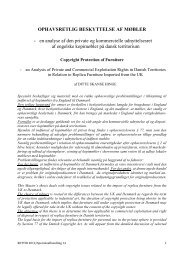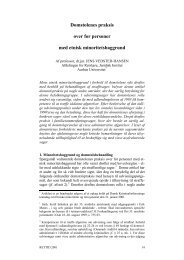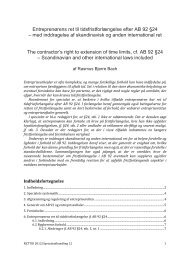Product liability under the CISG and Concurring tort law claims ...
Product liability under the CISG and Concurring tort law claims ...
Product liability under the CISG and Concurring tort law claims ...
You also want an ePaper? Increase the reach of your titles
YUMPU automatically turns print PDFs into web optimized ePapers that Google loves.
Firstly, <strong>the</strong> wording of <strong>the</strong> provision seems to make it a prerequisite that <strong>the</strong> injury or death has been<br />
“caused by <strong>the</strong> goods”. Interpreting <strong>the</strong> provision in this light has <strong>the</strong> unfortunate consequence that injury<br />
caused by lack of due care, or caused by a service provided by <strong>the</strong> seller, has not been excluded from <strong>the</strong><br />
scope of <strong>the</strong> Convention. Whe<strong>the</strong>r such an interpretation is in line with <strong>the</strong> reasoning behind <strong>the</strong> inclusion<br />
of art 5 in <strong>the</strong> Convention <strong>and</strong> <strong>the</strong> Convention in general, will have to be examined closer.<br />
Secondly, <strong>the</strong>re is <strong>the</strong> issue of consequential damages caused by an injury such as <strong>liability</strong> for pain <strong>and</strong> suffering.<br />
Whe<strong>the</strong>r <strong>the</strong>se types of <strong>claims</strong> have also been excluded from <strong>the</strong> <strong>CISG</strong> is not clear from <strong>the</strong> wording<br />
of <strong>the</strong> provision <strong>and</strong> it is <strong>the</strong>refore necessary to look elsewhere to find a possible answer to this question.<br />
Lastly, <strong>the</strong> words “to any person” have caused some confusion regarding both indemnification <strong>claims</strong> <strong>and</strong><br />
third party <strong>claims</strong>. Thus <strong>the</strong> extent of art 5 <strong>CISG</strong> has to be clarified.<br />
Damage to property is not encompassed in <strong>the</strong> wording of art 5 <strong>CISG</strong>. The question is whe<strong>the</strong>r <strong>the</strong> provision<br />
has to be interpreted e contrario or not. If <strong>the</strong> provision is to be interpreted e contrario <strong>the</strong> next issue to<br />
investigate is whe<strong>the</strong>r domestic rules of product <strong>liability</strong> can be relied on by <strong>the</strong> injured party as well as <strong>the</strong><br />
remedial rules in <strong>the</strong> Convention, giving rise to <strong>the</strong> issue of concurring <strong>claims</strong>.<br />
When <strong>the</strong>re are doubts about <strong>the</strong> application of <strong>the</strong> Convention, it is often best resolved by interpreting in<br />
favor of <strong>the</strong> Convention. However, <strong>the</strong>re are those who are of <strong>the</strong> opinion that some doubts are best resolved<br />
by or in conjunction with domestic <strong>law</strong>, at least when dealing with complex issues in <strong>the</strong> Convention.<br />
6<br />
The issues regarding product <strong>liability</strong> are not easily accessible. There are many complex issues <strong>and</strong> policy<br />
considerations to take into account. Therefore, <strong>the</strong> problem cannot be solved by merely interpreting in<br />
favor of <strong>the</strong> Convention. It is necessary to also examine domestic <strong>law</strong> <strong>and</strong> <strong>the</strong> general considerations behind<br />
domestic legislation concerning product <strong>liability</strong> in order to achieve a solution, which is satisfactory<br />
both to buyers <strong>and</strong> sellers as well as sufferers <strong>and</strong> wrongdoers.<br />
Thus it is not sufficient only to interpret <strong>the</strong> wording of art 5. Both <strong>the</strong> legislative history, case <strong>law</strong> <strong>and</strong> <strong>the</strong><br />
opinions in doctrine provide fur<strong>the</strong>r guidance into <strong>the</strong> interpretation of <strong>the</strong> provision. These elements will<br />
be drawn into <strong>the</strong> interpretation in <strong>the</strong> following sections.<br />
2.3. LEGISLATIVE HISTORY<br />
The legislative history of <strong>the</strong> <strong>CISG</strong> can provide evidence of <strong>the</strong> legislative intent <strong>and</strong> <strong>the</strong>reby aid <strong>the</strong> interpretation<br />
of <strong>the</strong> provisions in <strong>the</strong> <strong>CISG</strong>, as a secondary source of information. However, <strong>the</strong> legislative history<br />
does not provide a binding authority regarding how <strong>the</strong> provisions in <strong>the</strong> Convention should be interpreted.<br />
In fact <strong>the</strong> travaux préparatoires have been interpreted in very different ways by different authors<br />
<strong>and</strong> contracting states <strong>and</strong> it is often possible to find arguments in favor of both sides of a case in <strong>the</strong> legislative<br />
history.<br />
The proposal to exclude <strong>claims</strong> from <strong>the</strong> Convention, based on death or personal injury caused by <strong>the</strong><br />
goods came from Finl<strong>and</strong>, France <strong>and</strong> <strong>the</strong> United States. Their proposal was eventually accepted in Vienna<br />
<strong>and</strong> embodied in art 5. 7 However, <strong>the</strong> delegates at <strong>the</strong> Vienna Conferences struggled with <strong>the</strong> scope of <strong>the</strong><br />
provision during <strong>the</strong> drafting period of Convention, which <strong>the</strong> following section will show.<br />
6 Lookofsky, In dubio, page 265.<br />
7 (A/CONF.97/C.1/SR.3) para 11.<br />
RETTID 2012/Specialeafh<strong>and</strong>ling 26 6


